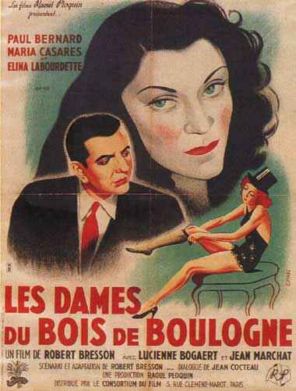
Perfection in art, per the french classical sense of it, derives from an economy of style that wizens down the particulars of narrative to bare, unornamented, wholesome elocution. The performances of Racine exemplify the ineluctable and spartan measurements of the french style: an unequivocal, studiously controlled passion d'être. The rule of persuasive parsimony applies to 4 of the art-realms that have had strong french traditions: the architectural, the literary, the pictorial, and the cinematic. The grand austerities of Corot demonstrate a profound learning of antiquity and a sensibility for undramatic order; even the plainsong gesticulations of the Impressionists suffice to point out those counter-narrative pictorial elements that correlate across periods of deferment. In cinema we have the felicitous aesthetic purity of Jean Renoir, and what came after Renoir, for which no greater director exists so circumspect & exact as Robert Bresson. Bresson in cinema would be, as Tarkovsky stressed, just & only Bresson, just himself and no other; but Bresson would also encourage in his matchless figure a possible summation of all that french cinema could be when removed from those alloys that were not distinctly french. Bresson was indeed himself, but he was also a return to Racine & Pascal & the french intelligence of the Port-Royal movement, since he was by some indications a thinker of Jansenist proportions.
...
Les Dames du Bois de Boulogne was erstwhile known as the film that was Bresson the filmmaker before he would become Bresson the artist; traces of the future would be here-and-there gleaned from an otherwise seemingly straightforward film. But this is imprecise. Bresson is never 'straightforward', and LDdBdB is a film that very carefully & subtly assembles the parts for a truly sublime denouement. The film exists for its climax, when we witness the visibly cool emotion of perfect revenge on the face of the otherworldly Maria Casares as she stands by and watches a frantic, nonplussed Paul Bernard attempt to drive away from the scene of his social humiliation. It would be enough for the film to end there, magnificently on a note of clever subjugation, but uncannily, with equally perfect execution, Bresson has Jean (Paul Bernard) come back, a newly dejected and fearful man changed from his once haughty, careless ways, and step into the sombre bridal chamber where his new bride, a debauched danseuse, awaits him. What occurs during their final, momentous encounter is indescribable: something like the unheard but perfumed wings of grace, irresistible even for the commonest, basest, most ordinary men to obey (here we glimpse cinematographically Bresson's Jansenist inclinations) weighs down on the impure lovers from the height of Bresson's angled camera-eye, and their embrace, occluding the constraints of societal pressures & aristocratic biases, brings together so miraculous an understanding of souls that any remembrance of what had occurred before is wiped off the screen in an odour of angelic harmony. (Bresson believes in irresistible grace, and some of his films are renowned for ending on notes of classically rapturous epiphany: viz Diary of a Country Priest, and A Man Escaped)
...
Without having to refer to the exquisite sense of perfection that the film alludes to (though not actually achieving it to the fanatical degree that Bresson would pursue later) Les Dames du Bois de Boulogne evinces once and for all Bresson's place in the classical french tradition; firstly, as a director capable of Renoir's humor and equanimity; and, secondly, as a director who allows for complete transparency in the omission of suggestive interpretations. Les Dames is a successful adaptation of Diderot's work, and a good expositor of Cocteau's dramatic flair. Bresson comes away with a high-grade for conventional filmmaking, yet manages to explode the ending in filmic terms that defy categorization (unless we can properly assess the ending as something akin to the science of miracles).
No comments:
Post a Comment